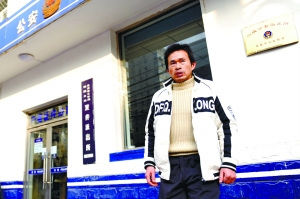Sina blogger Sheng Dalin, assistant to the editor in chief of Henan's Orient Today, updates [1] us on a story [2] which began last year in Hongshan District in Wuhan, Hubei province [3].
Tong Yihong's home was the last one standing in his village after neighbors in the area, slated for development, took the compensation package and relocated. As lot after lot of the surrounding land was leveled, the Tongs built a barbed wire fence around their property and waited for a better offer.
On November 18, 2010, a group showed up with a bulldozer and moved within throwing range of Tong's building. Police say that bricks Tong was throwing down from his roof put someone in the hospital; Tong says the group tore through his fence and began to roll in, that no one was injured and that, acting in self defense, he was only aiming for the bulldozer.
After local police took a statement from a skeptical Tong on November 19, telling him he faced charges of public disorder, he flew the next day to Beijing to ‘turn himself in’ and try pleading his case there. By November 21, Tong was in Hongshan police custody and on a train back to Wuhan, where he faced new charges of inflicting grievous bodily harm.
Last Wednesday, Tong was found guilty of the charge in a closed trial at an intermediate people's court in Hongshan district. According to media reports over the weekend which quote the official verdict, Tong was sentenced to four years in prison and ordered to pay RMB 190,000 in compensation to the alleged victim, surnamed Luo.
Sheng provides further background to the case:
进京“自首”的武汉被拆迁户童贻鸿,17日被武汉洪山区法院一审判刑4年,判赔19万余元。去年11月18日,童贻鸿在自家楼顶守护房子时,看到一群人和机械“冲向房子”,因担心房子被强拆,就从楼顶丢砖头,致一人被砸伤。法院认定,当事公司的人按合同要求到场平整土方,不是强拆,施工机械没有接触到童家房屋,童不构成正当防卫。但童的律师表示,童家房屋四周土地已拆迁平整完毕,无需再平整。童家提供的视频资料显示,其房屋四周铁丝网围墙当日被上述人扯开。警方调查认定,这群人当天携带的是被称为“啄木鸟”的破碎机。(据5月20日《新京报》)
Tong's attempt to turn himself in outside of the jurisdiction of the arresting police, in the hope of ensuring due process, received sustained media and public interest at the time. The fate of Tong's property, however, remains unclear. Tong has reportedly already filed an appeal.
The verdict comes at the same time that China's State Council makes yet another call [5] for an end to the practice of forced demolition of housing and land expropriation and, Sheng notes, putting the charges against Tong aside for a moment, the court took neither this nor public opinion which see Tong's actions as self defense into consideration, in a decision which he suspects might indirectly encourage developers to continue such behavior:
拆迁方的行为是不是强制拆迁,童贻鸿扔砖头是否属于“正当防卫”,与辩护律师提到的三个事实确实大有关系:一,童家房屋四周的土地是否已经拆迁平整完毕——如果这个属实,那么“平整土方”之说就明显是谎言;二,那群人携带的机械是不是破碎机——如果这个属实,那么“平整土方”更不应该采信,而应认定“强制拆迁”,因为破碎机是拆迁工具而不是平整工具;三,童家四周的铁丝网是否被那群人扯开——如果这个属实,那就有“私闯民宅”之嫌,即使不是强拆,童家也有自卫的权利。
上述三个细节的核实和认定并不困难。童家周围的土地是否已经平整完毕,应该有很多目击者;如果对方没有证据证明童家提供的视频资料是假造的,那就应该采信被告方的意见;而携带的工具为“啄木鸟”更是警方的认定,法院有什么证据足以否定警方的认定吗?
“机械没有接触到童家房屋”显然是法院认为不构成正当防卫的主要理由。可问题是:等机械接触到房屋的时候,不就晚了吗?《刑法》第二十条规定:“为了使国家公共利益、本人或者他人的人身、财产和其他权利免受正在进行的不法侵害,而采取的制止不法侵害行为,对不法侵害人造成损害的,属于正当防卫,不负刑事责任。 ”很显然,童贻鸿扔砖头就是为了制止不法侵害行为,而自那群人开着破碎机扯开铁丝网围墙的时候起,不法侵害就已经开始了。
The court's main reason for finding the self defense claim inadmissible seems to be that “the construction machinery did not come in contact with Tong's house”. However, if Tong had waited until the machinery came in contact with his house, wouldn't it have then been too late? According to Article 20 of the Criminal Law of The People's Republic of China, “Where a person conducts an act to stop an unlawful infringement in order to avert an immediate and unlawful infringement of the state's interest or of the public interest or of his own or another person's rights of the person, or property rights, or other rights, resulting in harm to the unlawful infringer, such an act shall be justifiable defence, and criminal responsibility shall not be borne for such an act.” Obviously, Tong Yihong was throwing down bricks in an attempt to avert an act of unlawful infringement, unlawful infringement which began the minute that group of workers started the crusher machine and ripped a hole in the barbed wire fence.
近来,因强拆而引起的自焚等恶性事件接连发生。为此,国务院办公厅13日发出通知,决定立即在全国开展征地拆迁制度规定落实情况专项检查,强化监管,严肃问责,坚决制止违法强拆行为,切实维护群众合法权益。而洪山区法院对童贻鸿的判决显然是对非法强拆的鼓励。
当然,国务院的《通知》对法院并没有约束力,法官只应该“以事实为依据,以法律为准绳。”可是,童贻鸿案的法官“以事实为依据”了吗?此案要想服众,洪山区法院至少应该就辩护律师提出的三个事实作出正面的回应。
Recently, a succession of self-immolation [7] and other horrible incidents [8] have taken place as a result of forced demolitions. In response to this, the State Council issued a notice on the 13th, announcing its decision to immediately launch an investigation into the legality of land expropriations and housing demolitions being carried out across the country, as well as to strengthen supervision and crack down on illegal demolition projects in an attempt to ensure people's legal interests are being uphold. The court's ruling against Tong Yihong, however, clearly encourages illegal demolitions.
Of course, the State Council notice has no legally binding power over courts, and judges in any event should measure facts against the letter of the law. If confidence is to be had in this case, the court should at least give a direct response to the three facts put forth by the defense lawyer.
